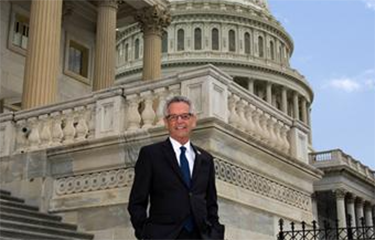An retiring U.S. congressman filed a bill in the U.S. House of Representatives on Thursday, 8 December calling for more research on offshore aquaculture to ensure the industry can be developed in a sustainable way.
U.S. Rep. Alan Lowenthal (D-California), introduced the SEAfood Act, which would require the U.S. Government Accountability Office to produce a report within two years that encapsulates the lessons learned in aquaculture permitting since the GAO’s 2008 report. The calls out specific focuses of proposed research – including consultations and planning with aquaculture operators, tribal groups, and underserved communities, and a study of the net economic and social benefits of aquaculture projects.
The bill also calls on NOAA to create a program that will review fish farm designs to determine if they can operate in a fashion that protects marine environments and prevent interactions with native wildlife, even during times of severe weather. It also would have the National Academies of Sciences, Engineering, and Medicine conduct a study to create "efficient and effective" permitting and regulation.
Lowenthal’s bill comes after a report was published in Marine Policy highlighting the “strong potential” for offshore aquaculture in U.S. federal waters, but indicates knowledge gaps remain in how such developments should be managed and regulated.
“If the U.S. is to develop thriving and sustainable offshore aquaculture, then it is imperative that we do so in a science-based and science-directed way,” Lowenthal said. “To do that we must build out our knowledge base on both the problems that currently exist and the solutions potentially available. The SEAfood Act puts us on the path toward increasing our understanding of both.”
The bill has bipartisan support in the U.S. House, with U.S. Rep. Nancy Mace (R-South Carolina), among the cosponsors for the bill. U.S. Reps. Chellie Pingree (D-Maine) and Julia Brownley (D-California) also are cosponsors, and Lowenthal’s statement said U.S. Sen. Kirsten Gillibrand (D-New York) will push a companion bill in the U.S. Senate.
Time is running out on the current session of Congress, as a new session will begin in January 2023. Any bills that have not been passed before the new session starts must be refiled, and Lowenthal did not seek reelection in his Southern California district.
A message to his office was not immediately returned on Friday, 9 December.
Still, those advocating for more research on aquaculture development heralded the bill, saying it’s necessary as the U.S. looks to increase domestic seafood production.
“It’s a responsible, science-backed approach that’s good for the economy, for our domestic seafood industry, for our ocean and for American consumers,” Environmental Defense Fund Senior Vice President Eric Schwaab said. “As the U.S. works to keep pace with global aquaculture growth, we must bring together the most up to date science, industry best practices and diverse local voices to guide us forward.”
Photo courtesy of Alan Lowenthal/lowenthal.house.gov







